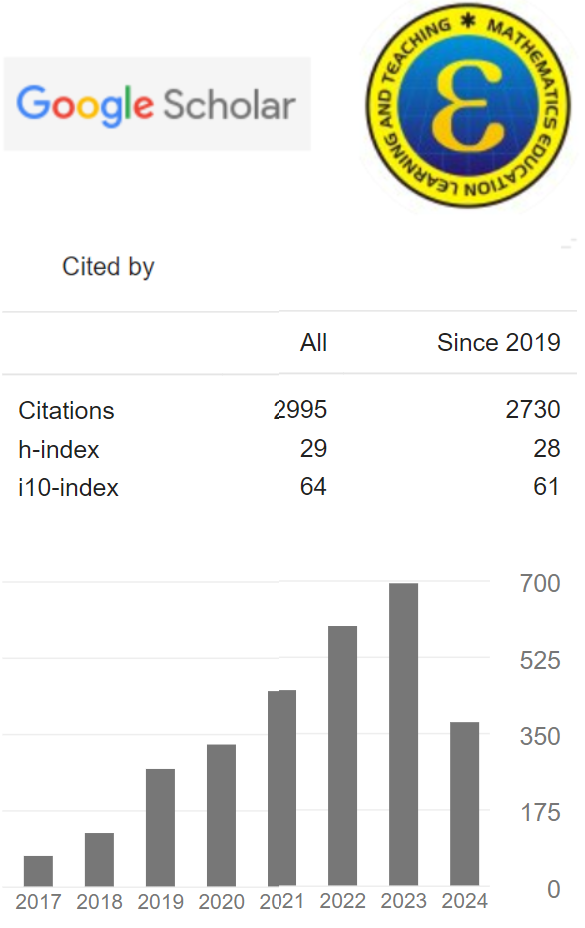Factors Influencing Mathematics Learning: Path Analysis
(1) Universitas Muhammadiyah Purwokerto
(2) Universitas Negeri Yogyakarta
(*) Corresponding Author
Abstract
The factors that influence the learning of mathematics are very diverse. On this occasion, the focus is on gender, learning styles, learning independence, and motivation. These factors are fascinating because they always appear in learning and research themes. This study aimed to examine how the influence of these factors on learning achievement. This research is associational research which is a descriptive research methodology. The research subjects are 5th-semester students who take calculus courses, mathematics education study program, Universitas Muhammadiyah Purwokerto. The instruments used in this study were questionnaires and learning outcomes tests. To analyze the data used, LISREL (Linear Structural Relationship) software. The results showed that not all variables affect each other directly. Gender influences learning motivation. Learning style has an impact on learning motivation. Learning motivation affects learning independence. Learning independence influences learning achievement. Learning motivation influences learning achievement. If it is seen how they influence learning achievement, then learning motivation has the most significant impact compared to gender, learning style, and learning independence.
Keywords
Full Text:
PDFReferences
Ames, C. (1992). Classrooms: Goals, structures, and student motivation. Journal of Educational Psychology, 84(3), 261–271. https://doi.org/10.1037/0022-0663.84.3.261
Anderson, J. C., & Gerbing, D. W. (1988). Structural equation modeling in practice: A review and recommended two-step approach. Psychological Bulletin, 103(3), 411–423. https://doi.org/10.1037/0033-2909.103.3.411
Arbuckle, J. L., & Wothke, W. (1995). Amos 4.0 Users Guide. SmallWaters Corporation.
Baltaci, S., Yildiz, A., & Özcakir, B. (2016). The Relationship between Metacognitive Awareness Levels, Learning Styles, Genders and Mathematics Grades of Fifth Graders. Journal of Education and Learning, 5(4), 78. https://doi.org/10.5539/jel.v5n4p78
Browne, M. W., & Cudeck, R. (1992). Alternative Ways of Assessing Model Fit. Sociological Methods & Research, 21(2), 230–258. https://doi.org/10.1177/0049124192021002005
Casey, B. M., & Ganley, C. M. (2021). An examination of gender differences in spatial skills and math attitudes in relation to mathematics success: A bio-psycho-social model. Developmental Review, 60(October 2020), 100963. https://doi.org/10.1016/j.dr.2021.100963
Demİr-Ayaz, A. (2022). A Path-Analytical Investigation of Perceptual Learning Styles , Future Self- guides and L2 Motivation A Path-Analytical Investigation of Perceptual Learning Styles , Future Self-guides and L2 Motivation. Novitas-ROYAL (Research on Youth and Language), 16(1), 1–19.
DePorter, B., & Hernacki, M. (1993). Quantum Learning. Judy Piatkus.
Eccles, J. S., & Wigfield, A. (2020). From expectancy-value theory to situated expectancy-value theory: A developmental, social cognitive, and sociocultural perspective on motivation. Contemporary Educational Psychology, 61(xxxx), 101859. https://doi.org/10.1016/j.cedpsych.2020.101859
Felder, R. M., & Brent, R. (2005). Understanding Student Differences. Journal of Engineering Education, 94(1), 57–72. https://doi.org/10.1002/j.2168-9830.2005.tb00829.x
Fraenkel, J. R., Wallen, N. E., & Hyun, H. H. (2012). How to Design and Evaluate Research in Education (8th ed.). McGraw-Hill.
Harvey, V. S., & Chickie-Wolfe, L. A. (2007). Fostering independent learning: practical strategies to promote student success. In Guilford Publications, Inc. The Guilford Press.
Houston, K., & Lazenbatt, A. (1996). A Peerâ€tutoring Scheme to Support Independent Learning and Group Project Work in Mathematics. Assessment & Evaluation in Higher Education, 21(3), 251–266. https://doi.org/10.1080/0260293960210305
Kolb, D. A. (2015). Experiential learning : experience as the source of learning and development (second). Pearson Education.
Middleton, J. A., & Spanias, P. A. (1999). Motivation for Achievement in Mathematics: Findings, Generalizations, and Criticisms of the Research. Journal for Research in Mathematics Education, 30(1), 65. https://doi.org/10.2307/749630
Moh Ghoizi Eriyanto, M.V. Roesminingsih, Soedjarwo, & Ivan Kusuma Soeherman. (2021). The Effect of Learning Motivation on Learning Independence and Learning Outcomes of Students in the Package C Equivalence Program. IJORER : International Journal of Recent Educational Research, 2(4), 455–467. https://doi.org/10.46245/ijorer.v2i4.122
Mulyono, D. (2017). The influence of learning model and learning independence on mathematics learning outcomes by controlling students’ early ability. International Electronic Journal of Mathematics Education, 12(3), 689–708. https://doi.org/10.29333/iejme/642
Palomares-Ruiz, A., Cebrián-MartÃnez, A., GarcÃa-Toledano, E., & López-Parra, E. (2021). Digital gender gap in university education in Spain. Study of a case for paired samples. Technological Forecasting and Social Change, 173, 121096. https://doi.org/10.1016/j.techfore.2021.121096
Pedhazur, E. J. (1997). Multiple Regression in Behavioral Research (third). Nelson Thomson Learning. https://doi.org/10.2307/2285468
Rose, C., & Nicholl, M. J. (1997). Accelerated Learning For The 21st Century. Dell Publishing.
Sinaga, S. J. (2022). The Effect of Motivation and Learning Style on Students’ Mathematics Learning Achievement. Jurnal Basicedu, 6(3), 3554–3562. https://doi.org/10.31004/basicedu.v6i3.2669
Tanaka, M. (2022). Motivation, self-construal, and gender in project-based learning. Innovation in Language Learning and Teaching, 1–15. https://doi.org/10.1080/17501229.2022.2043870
Yudha, R. P. (2019). The Effect of Learning Approaches and Student Learning Styles on Mathematical Reasoning Abilities. Eduma : Mathematics Education Learning and Teaching, 8(2), 10. https://doi.org/10.24235/eduma.v8i2.5344
Yunus, A. S. M., & Wan Ali, W. Z. (2009). Motivation in the learning of mathematics. European Journal of Social Sciences, 7(4), 93–101.
DOI: 10.24235/eduma.v11i2.10514
Article Metrics
Abstract view : 55 timesPDF - 14 times
Refbacks
- There are currently no refbacks.
Copyright (c) 2022 Eduma : Mathematics Education Learning and Teaching


.png)










